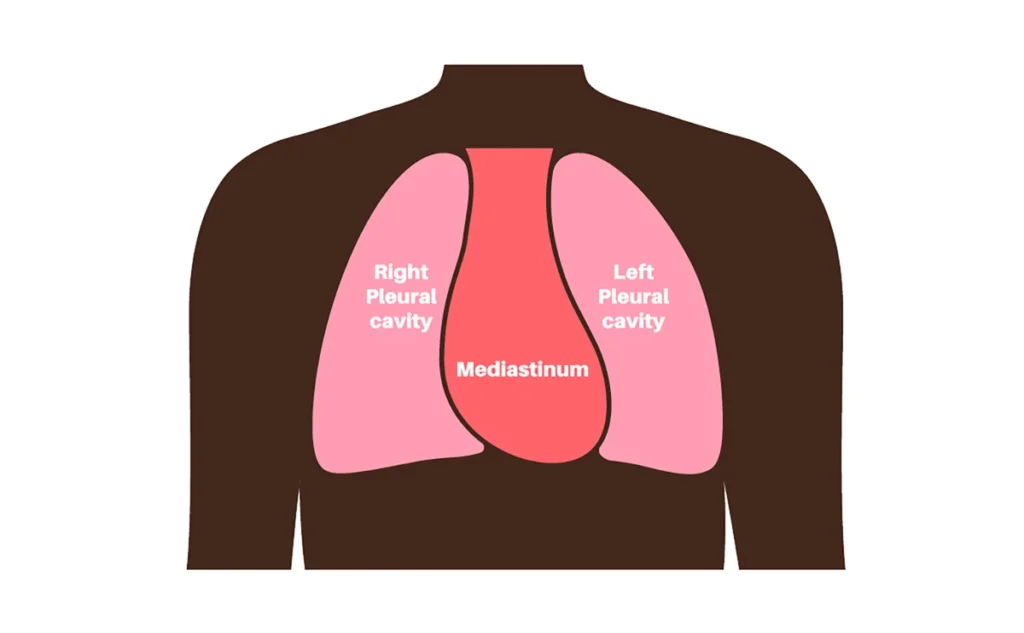Dr. Shilpa Gandhi | Leading Consultant Minimally Invasive Thoracic Surgeon In Nagpur
Meet Our Doctor
Dr. Shilpa Gandhi
MBBS, DNB General Surgery DNB Thoracic Surgery
Dr. Shilpa Gandhi is a trusted and experienced healthcare professional known for her compassionate care and expertise. Committed to delivering personalized treatments and improving patient well-being.


Mediastinal Tumor Surgery
Mediastinal tumor surgery is a critical medical procedure used to remove tumors located in the mediastinum, the central part of the chest cavity. The mediastinum houses vital organs, including the heart, trachea, esophagus, and major blood vessels, making tumors in this area potentially life-threatening. Early detection and intervention are essential for the successful treatment of mediastinal tumors. This article explores the importance of mediastinal tumor surgery, its procedures, recovery process, and the advanced treatment options available for patients.
Understanding Mediastinal Tumors
Mediastinal tumors are abnormal growths that can develop in any of the compartments of a mediastinum. These tumors can be benign (non-cancerous) and malignant (cancerous). Common types of mediastinal tumors include thymomas, lymphomas, neurogenic tumors, or germ cell tumors. While some tumors might not cause symptoms, others can lead to issues like chest pain, breathing difficulties, or persistent coughing.
When is Mediastinal Tumor Surgery Needed?
Mediastinal tumor surgery is generally recommended when:
- The tumor is causing symptoms such as pain or difficulty breathing.
- The tumor is malignant and requires removal for further treatment.
- A biopsy is needed to determine whether the tumor is cancerous.
- The tumor is large and pressing on vital structures.
Types of Mediastinal Tumor Surgery
There are several surgical approaches to treat mediastinal tumors, depending on the size, type, and location of the tumor. Some common surgical methods include:
Thoracotomy: A traditional open-chest surgery performed to access and remove tumors in the mediastinum.
Video-Assisted Thoracoscopic Surgery (VATS): A minimally invasive procedure that uses small incisions and a camera to remove tumors. VATS is preferred for smaller, less invasive tumors due to its quicker recovery time and lower complication risk.
Robotic-Assisted Surgery: A cutting-edge method that provides high precision and control, allowing surgeons to operate with enhanced vision and flexibility.
Mediastinoscopy: Used mainly for diagnosing and staging cancers, this procedure allows the surgeon to access the mediastinal area using a small camera inserted through a small incision in the neck.
Benefits of Mediastinal Tumor Surgery
- Effective Tumor Removal: Surgery is the most effective way to remove the tumor and prevent it from growing or spreading to other areas.
- Improved Symptom Relief: Surgery can alleviate symptoms such as chest pain, coughing, and shortness of breath caused by the tumor’s pressure on surrounding structures.
- Early Detection: Surgery may involve biopsies, helping to identify whether the tumor is cancerous and enabling further treatment options such as chemotherapy or radiation.
Risks and Complications
While mediastinal tumor surgery is generally safe, it does carry some risks, including:
- Bleeding or infection at the surgical site.
- Injury to surrounding organs like the heart, lungs, or blood vessels.
- Scarring or damage to the airways or esophagus.
- Recurrence of the tumor, especially in malignant cases.
Recovery After Mediastinal Tumor Surgery
The recovery process can vary based on the type of surgery performed or the patient’s overall health. Typically, recovery involves:
- Hospital Stay: Most patients will need to stay in the hospital for a few days for monitoring and pain management.
- Post-Operative Care: This includes wound care, pain management, and respiratory therapy to help with breathing and prevent complications like pneumonia.
- Follow-Up: Regular follow-up appointments with the surgeon and oncologist are necessary to monitor recovery and detect any recurrence of the tumor.
Conclusion
Mediastinal tumor surgery is a critical treatment for patients diagnosed with tumors in the chest area. Early detection, appropriate surgical intervention, and comprehensive post-operative care are essential for achieving the best outcomes. If you or a loved one has been diagnosed with a mediastinal tumor, consult with a skilled thoracic surgeon or oncologist to explore your surgical options and develop an individualized treatment plan.



